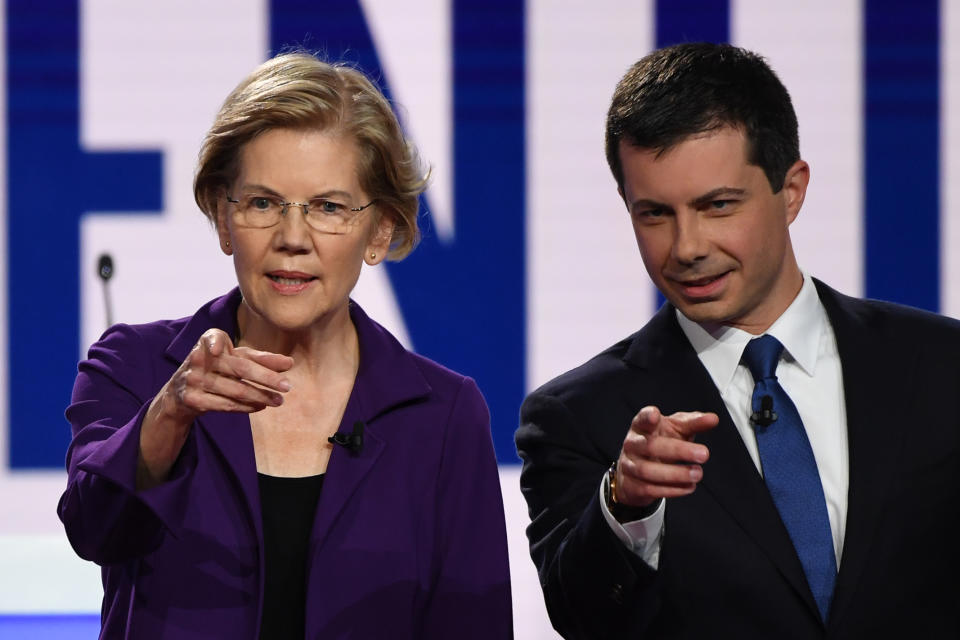Democratic candidates spar over Medicare for All
Health care became a major talking point during the latest round of the Democratic presidential debates on Tuesday night. Several candidates, including Mayor Pete Buttigieg (D-IN) and Sen. Elizabeth Warren (D-MA), sparred over Medicare for All and whether or not it can actually be a reality.
When asked whether or not taxes would go up for the middle class in order to fund Medicare for All, Warren was vague with her answer, but stressed that “costs will go up for the wealthy” and that she wouldn’t sign a bill that wouldn’t lower costs for middle class families.
Buttigieg, however, was not satisfied with her answer, stating: “We heard it tonight. A yes-or-no question that didn’t get a yes-or-no answer. This is why people are so frustrated with Washington in general and Capitol Hill in particular ... Your signature is to have a plan for everything except for this.”

Warren is a supporter of Medicare for All, and has stated that she would pay for it by taxing the wealthy. However, she has not yet released an official cost for her health care plan.
Buttigieg’s health care plan, dubbed Medicare for All Who Want It, would not force people off their private insurance. He has emphasized that his plan is all about choice, and those who still want to stay on private insurance can do so.
“Medicare for All who want it is Medicare for All who can afford it,” Warren said.
Through Buttigieg’s plan, everyone would automatically be involved in universal health care coverage for those who are eligible. It would also expand premium subsidies for low-income individuals, cap out-of-pocket costs for seniors on Medicare, and limit what health care providers charge for out-of-network care at double what Medicare pays for the same service.
And as he detailed in an op-ed for The Washington Post, “if private insurers are unable or unwilling to offer better plans than they do today, competition from this public alternative will naturally lead to Medicare-for-All.” The plan is projected to cost about $1.5 trillion over a decade, and paid through cost savings and corporate tax reform.
“This is how public alternatives work,” Buttigieg previously stated. “They create a public alternative that the private sector is then forced to compete with.”
‘Our country will be horrifyingly polarized’
Buttigieg’s plan leaves room for private insurers to still compete in the marketplace, but this time versus the public option.
Warren, though, has been vocal about her displeasure with health insurance companies, attributing them to rising health care costs and overall affordability issues. In an earlier round of debates back in June 2019, she made clear that she supported a Medicare for All plan that would eliminate private health insurance altogether.
“I don’t understand why you believe the only way to deliver affordable coverage to everybody is to obliterate private plans,” Buttigieg said to Warren about her plan. “Our country will be horrifyingly polarized, even more than now, after everything we've been through, after everything we are about to go through, this country will be even more divided. Why unnecessarily divide this country over health care when there's a better way to deliver coverage for all?”
Warren isn’t the only candidate to support that idea, however. After the Republican National Committee Research tweeted that Sanders called for abolishing private health insurance, Sanders responded: “You’re damn right.”
Adriana is an associate editor for Yahoo Finance. Follow her on Twitter @adrianambells.
READ MORE:
Economist: Medicare costs need to be brought 'under control' before expansion
Pete Buttigieg's prescription drug plan eyes funding for opioid treatment
Read the latest financial and business news from Yahoo Finance
Follow Yahoo Finance on Twitter, Facebook, Instagram, Flipboard, SmartNews, LinkedIn, YouTube, and reddit.
